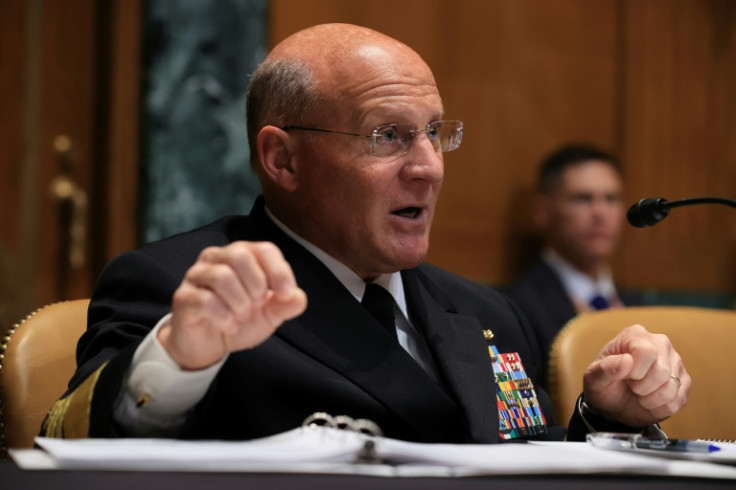Navy Chief Says US Must Prepare For Chinese Invasion Of Taiwan Within A Year
KEY POINTS
- China has not ruled out the use of force to bring Taiwan under its control
- Reports say the Chinese President wants military to have the capability to take control of the island by force by 2027
- State Secretary Blinken has said China was pursuing an agenda to annex Taiwan on a "much faster timeline"
The Naval Chief, Admiral Michael Gilday, on Wednesday warned China could invade Taiwan as soon as this year or next, adding he was prioritizing a "fight tonight" posture for the US Navy, in response to "what we're seeing from an increasingly aggressive China and Russia."
Referring to Chinese President Xi Jinping's warning at the 20th party congress in Beijing about Taiwan's unification, Admiral Gilday said: "It's not just what President Xi says, but it's how the Chinese behave and what they do.
"What we've seen over the past 20 years is that they have delivered on every promise they've made earlier than they said they were going to deliver on it," he said.
"So when we talk about the 2027 window, in my mind, that has to be a 2022 window or potentially a 2023 window. I can't rule it out," Admiral Gilday said, while speaking at a discussion, hosted by the Atlantic Council.
According to a report in the South China Morning Post (SCMP), Admiral Gilday said the aggressive posturing by China and Russia had pushed the U.S. military to speed up alliances and cooperation agreements with allies and partners.
Terming relations with allies as "absolutely critical," he called them "an asymmetric advantage," which the Chinese and Russians "don't enjoy in the same numbers" as the U.S. does.
Last month, CIA Deputy Director David Cohen said while President Xi has not made the decision to invade Taiwan, he wants the Chinese military to have the capability to take control of the island by force by 2027.
The U.S. is committed by law to support Taiwan's military defense capability – a position that Beijing vehemently opposes.
Addressing delegates at the 20th party congress in the Great Hall of the People in Beijing, the Chinese president had on Sunday said Beijing would do its utmost to achieve peaceful reunification with Taiwan, but would not rule out the use of force to bring the island under its control.
"Resolving the Taiwan question is a matter for the Chinese, a matter that must be resolved by the Chinese. We will continue to strive for peaceful reunification with the greatest sincerity and the utmost effort, but we will never promise to renounce the use of force, and we reserve the option of taking all measures necessary," Xi said.
The Chinese president reaffirmed the military role as a strategic tool for achieving the ideological goal of national rejuvenation and said that use of military power needs to be normalized to win regional wars.
Secretary of State Antony Blinken had Monday said China under President Xi is pursuing an agenda to annex Taiwan on a "much faster timeline," and warned of global economic disruption if it were to happen.
"Instead of sticking with the status quo that was established in a positive way," Secretary Blinken said, China has made a "fundamental decision that the status quo is no longer acceptable, and Beijing is determined to pursue reunification on a much faster timeline."
Beijing views the self-governed democracy of Taiwan as a renegade province to be united with the mainland, by force if necessary.
Tensions between Taiwan and mainland China have been high since a visit by House Speaker Nancy Pelosi to Taipei in August. China responded by ordering several days of military drills around the island democracy.

© Copyright IBTimes 2025. All rights reserved.






















